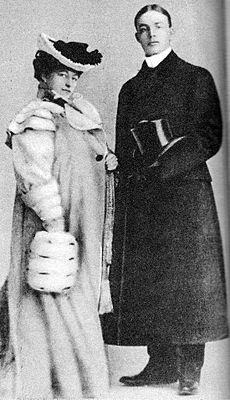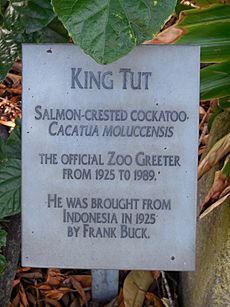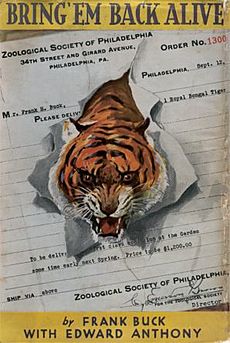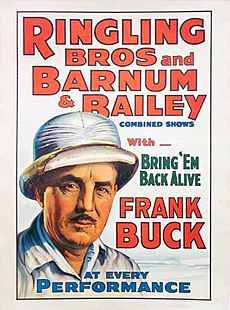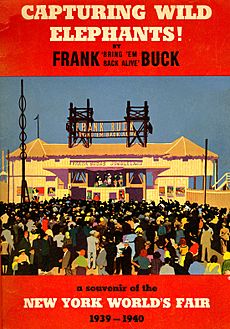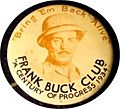Frank Buck (animal collector) facts for kids
Quick facts for kids
Frank Buck
|
|
|---|---|
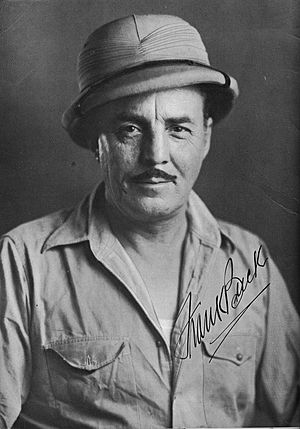
Buck in a signed photograph from his souvenir booklet for the 1939 New York World's Fair
|
|
| Born |
Frank Howard Buck
March 17, 1884 Gainesville, Texas, U.S.
|
| Died | March 25, 1950 (aged 66) Houston, Texas, United States
|
| Occupation | |
| Years active | 1911–49 |
| Spouse(s) |
|
Frank Howard Buck (born March 17, 1884 – died March 25, 1950) was a famous American adventurer. He was known for collecting wild animals, writing books, and starring in movies.
Starting in the 1910s, Frank Buck went on many trips to Asia. His goal was to find and collect exotic animals. He brought over 100,000 live animals back to the United States for zoos and circuses. This made him known as a great adventurer.
He wrote seven books about his exciting trips, starting with Bring 'Em Back Alive in 1930. This book became very popular. From 1932 to 1943, he also starred in seven adventure movies based on his real-life experiences. These movies often showed exciting "fights" with wild animals.
Frank Buck also worked as a director for the San Diego Zoo for a short time. He showed wild animals at big events like the 1933–34 Century of Progress exhibition and the 1939 New York World's Fair. He even toured with the Ringling Bros. and Barnum & Bailey Circus. His hometown of Gainesville, Texas named the Frank Buck Zoo after him.
Contents
Frank Buck's Early Life
Frank Buck was born in Gainesville, Texas, in 1884. He grew up in Dallas. He was very good at geography in school. However, he wasn't as good at other subjects. He left school after finishing seventh grade.
As a child, he started collecting birds and small animals. He also tried farming and sold songs. Later, he worked as a cowpuncher, which is a term for a cowboy used in Texas. He once traveled with cattle to Chicago and decided to stay there.
In Chicago, Frank Buck worked at the Virginia Hotel. There, he met Lillian West, who wrote for the Chicago Daily News. She was one of the few female drama critics in the country. Frank Buck described her as a kind and happy person. They got married in 1901.
Collecting Wild Animals
In 1911, Frank Buck won $3,500 in a poker game. He decided to use the money to travel to Brazil. He brought back exotic birds to New York. He was surprised by how much money he made selling them.
After this, he traveled to Singapore. This was the start of many trips to Asia to collect animals. He learned to build traps and snares to catch animals safely in the jungles. He then sold these animals to zoos and circuses all over the world. After catching the animals, he often traveled with them on ships. This helped make sure they stayed alive during the long journey to the United States.
Frank Buck and Lillian West divorced in 1913. The next year, he married Nina C. Boardman. She was a stenographer from Chicago. Nina sometimes joined him on his jungle trips.
Frank Buck and the San Diego Zoo
In 1923, Frank Buck became the first full-time director of the San Diego Zoo. The Zoo was still new at the time. It had started with animals left over from a big event in 1915. The Zoo's founder, Dr. Harry M. Wegeforth, had a strong vision for its future.
Frank Buck agreed to collect animals for the Zoo before becoming its director. Everyone hoped he would bring elephants. He found two female Asian elephants in Calcutta named "Empress" and "Queenie." He bought them for the Zoo. When the elephants arrived in San Diego, Dr. Wegeforth rode them through the city streets to the Zoo.
Frank Buck also brought other animals from Asia. These included two orangutans, a leopard cub, and many types of birds. He also brought a 23-foot reticulated python named "Diablo." This snake became famous because it wouldn't eat on its own. People would gather to watch a team of men force-feed it. This even became a paid event.
Frank Buck started his job as director on June 13, 1923. He was excited at first. He told reporters, "We have the best zoo west of Chicago, and we are going to make it even bigger and better." However, Frank Buck was a very independent person. He soon had disagreements with the Zoo's board of directors. He was fired after only three months.
Even after leaving the Zoo, Frank Buck made one more important contribution. In 1925, he brought a shipment of animals to San Diego. This included a salmon-crested cockatoo named "King Tut" from the Maluku Islands. King Tut was sold to a local couple who shared him with the Zoo. King Tut became the Zoo's "official greeter" for many years. He appeared in movies, TV shows, and plays. After King Tut passed away in 1990, a bronze statue of him was placed where he used to sit. The statue's plaque says that Frank Buck brought the bird from Indonesia.
Writing, Acting, and Being Famous
Frank Buck married Muriel Reilly in 1928, and they had a daughter named Barbara. By the late 1920s, he was the world's top supplier of wild animals.
A radio personality named Floyd Gibbons suggested that Frank Buck write about his adventures. So, he worked with a journalist to write Bring 'Em Back Alive (1930). This book became a huge success. It also gave him the nickname Frank "Bring 'Em Back Alive" Buck.
He then had a film crew join him on his next trip to Asia. They made a movie called Bring 'Em Back Alive, released in 1932. Frank Buck starred as himself in the movie. His next book, Wild Cargo (1932), also became a bestseller. It was made into a movie in 1934, where Buck again played himself.
In 1933, Frank Buck created a wild animal exhibit for Chicago's Century of Progress exhibition. It was called Frank Buck's Jungle Camp. Over two million people visited this camp. It showed what his camp looked like when he collected animals in British Malaya. After the fair, he moved the camp to Amityville, New York.
His third book, Fang and Claw (1935), was also made into a movie. Frank Buck directed and starred in this film. He also wrote Tim Thompson in the Jungle (1935), a fiction book based on his experiences.
Frank Buck was very proud of his 1936 book for elementary school students, On Jungle Trails. He said children often told him how much they learned from it. In 1937, he starred in Jungle Menace, a 15-part movie series. This was the only movie where he didn't play himself.
In 1938, the Ringling Bros. and Barnum & Bailey Circus offered Frank Buck a lot of money to tour with them. He was a main attraction and would enter the show on an elephant. He refused to join the actors' union, saying he was a "scientist, not an actor." The union eventually allowed him to introduce Gargantua the gorilla without joining.
The next year, Frank Buck brought his jungle camp to the 1939 New York World's Fair. "Frank Buck's Jungleland" showed rare birds, reptiles, and wild animals. It also had a trained orangutan named Jiggs. He also provided performing Asian elephants and a large "monkey mountain" with 600 monkeys. His sixth book, Animals Are Like That, came out that year.
World War II stopped Frank Buck from going on expeditions to Asia. But he stayed busy giving talks and appearing on radio shows. During the war, he continued to publish books and star in films. In 1941, he published his life story, All in a Lifetime. He also narrated Jungle Cavalcade, which used footage from his earlier movies. He appeared in Jacaré (1942) and starred in Tiger Fangs (1943). His last book, Jungle Animals, was published in 1945 for schoolchildren.
Later Years and Death
After World War II ended, Frank Buck went back to collecting animals. He said, "You dig the same old-fashioned pits and use the same old-fashioned knives and come back with the same old-fashioned tigers." He estimated that he had captured many animals, including 49 elephants, 60 tigers, 63 leopards, and over 100,000 wild birds. Sultan Ibrahim of Johor was a good friend and often helped him.
Frank Buck's last movie role was in the 1949 comedy Africa Screams with Abbott and Costello. His last recorded work was Tiger, a children's record from 1950. Frank Buck passed away from lung cancer on March 25, 1950, in Houston, Texas. He was 66 years old.
Frank Buck's Legacy
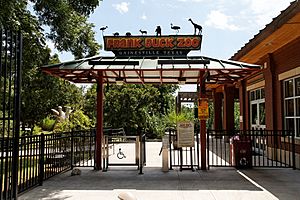
In 1953, his book Bring 'Em Back Alive was made into a comic book in the Classics Illustrated series. The next year, the Gainesville Community Circus in his hometown was renamed the Frank Buck Zoo in his honor.
In 1982–83, actor Bruce Boxleitner played Frank Buck in the TV series Bring 'Em Back Alive. This show was partly based on Buck's books and adventures. In 2008, the Frank Buck Zoo opened the Frank Buck Exhibit. It shows tools and items that belonged to Frank Buck, donated by his daughter Barbara.
Frank Buck's Books
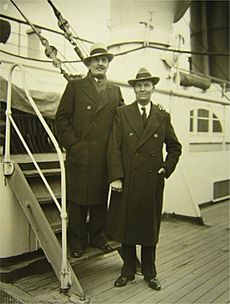
- Bring 'Em Back Alive (1930), with Edward Anthony
- Wild Cargo (1932), with Anthony
- Fang and Claw (1935), with Ferrin Fraser
- Tim Thompson in the Jungle (1935), with Fraser
- On Jungle Trails (1936), with Fraser
- Animals Are Like That (1939), with Carol Weld
- All in a Lifetime (1941), with Fraser
- Jungle Animals (1945), with Fraser
Frank Buck's Movies
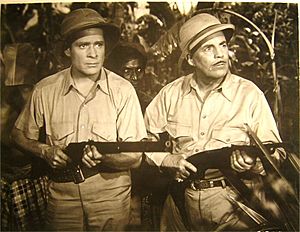
| Year | Title | Role | Notes |
|---|---|---|---|
| 1932 | Bring 'Em Back Alive | Himself / Narrator | Documentary |
| 1934 | Wild Cargo | Himself | Documentary; also producer |
| 1935 | Fang and Claw | Himself | Documentary; also director |
| 1937 | Jungle Menace | Frank Hardy | |
| 1941 | Jungle Cavalcade | Narrator / Himself | Documentary |
| 1942 | Jacaré | Himself | Documentary |
| 1943 | Tiger Fangs | Himself | |
| 1949 | Africa Screams | Himself | Final film role |
Images for kids
See also
 In Spanish: Frank Buck para niños
In Spanish: Frank Buck para niños
 | Aurelia Browder |
 | Nannie Helen Burroughs |
 | Michelle Alexander |


